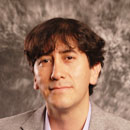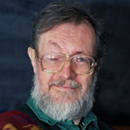Literature
English majors who elect to concentrate in literature read, reflect on, discuss, and write about literature in its various forms and genres. Progressing to an advanced level as readers and writers through a series of required survey and topics courses, they also select from electives in literature and language studies. The capstone project is completed in a two-semester sequence; students read and research their chosen topic during a semester-long individual tutorial and write the capstone essay during the following semester.
By planning early in consultation with an academic advisor, students may be able to reduce the time it takes to complete a bachelor’s degree in literature to 3 or 3½ years.
The following goals and associated learning outcomes delineate what we strive for students to achieve when they complete a major program of study in English:
Goal 1: Canons and conventions
Upon completion of the major program of study in English, students will be able to
- demonstrate an awareness of the respective advantages of qualitative and quantitative approaches, while demonstrating an appreciation for the special significance of the qualitative approach for scholars who work in the humanities areas.
- demonstrate appreciation for the richness and diversity of the human condition and the human experience, applying insights from the aesthetic/creative, global/historical, individual/societal, and scientific/quantitative knowledge perspectives.
Goal 2: Intellectual milestones
Upon completion of the major program of study in English, students will be able to
- express ideas and convey information in clear and confident oral discourse.
- respond knowledgeably and flexibly to written texts in a range of genres.
- respond critically and analytically to moral issues and make informed ethical choices.
- participate as active citizens in local and global communities.
Goal 3: Interpretive/critical thinking and writing
Upon completion of the major program of study in English, students will be able to
- summarize content in materials from the various humanities fields.
- interpret humanities texts critically through close reading.
- demonstrate awareness of ethical and legal guidelines and distinguish between argument and opinion as they collect, analyze, and synthesize pertinent data from appropriate sources to create a valid argument.
Goal 4: Professional discourse and dialogue
Upon completion of the major program of study in English, students will be able to
- write in a professional manner.
- speak in a professional manner.
- work collaboratively in professional settings.
- explore career options.
| Course Code | Course Title | Credits |
|---|---|---|
| Core Courses | ||
| ENG209 | Intro to Literature & Literary Studies | 3 |
| ENG210 | Survey of American Literature (KP) | 3 |
| ENG218 | British Literature (KP) | 3 |
| HUM103 | Invitation to the Humanities | 3 |
| HUM399 | Humanities Internship Seminar | 1 |
| HUM400 | Humanities Field Experience | 4 |
| Concentration Courses | ||
| HUM419 | Seminar in Hum: Readings & Research | 3 |
| HUM420 | Seminar in Humanities | 3 |
| Choose 1 from the following: | ||
| ENG312 | Literature of Postcolonial World | 3 |
| ENG313 | American Multiethnic Literature | 3 |
| Choose 1 from the following: | ||
| COM209 | Journalism | 3 |
| ENG208 | The Structure of the English Language | 3 |
| ENG219 | Creative Writing | 3 |
| Choose 2 from the following: | ||
| ENG211 | Modern Drama | 3 |
| ENG214 | Special Topics in Literature | 3 |
| ENG217 | Contemporary Global Literature (KP) | 3 |
| ENG222 | Lyric Poetry | 3 |
| ENG224 | Film & Literature | 3 |
| ENG225 | The Short Story (KP) | 3 |
| Choose 1 from the following: | ||
| ENG304 | Stories of Origin | 3 |
| ENG340 | Classics of World Literature | 3 |
| Choose 1 from the following: | ||
| HIST103 | World Civilization I | 3 |
| HIST123 | American Civilization I | 3 |
| HIST124 | American Civilization II | 3 |
Additional Courses
English Electives: 9 credits
Social Science Elective: 3-4 credits
Science Elective: 3-4 credits
Math Elective: 3 credits
Foreign Language: 0-12 credits
Service Learning: 3 credits
Major Requirements: 65-79 credits
Core Curriculum Requirements: 15-21 credits
Unrestricted Electives: 20-40 credits
Minimum credits required for graduation: 120
ENG100I - Writing Skills with Lab
This course, designed to prepare the nonnative speaker of English for the Core Writing I - Writing II sequence, addresses the development of reading, writing, speaking, and listening competencies crucial to the successful completion of college coursework. Placed in this course on the basis of the TOEFL score, students work on oral and written English language skills through informal exercises and formal oral and written projects; the lab component of this course provides an opportunity for individual conferencing around written assignments. Students must receive a grade of “C” or higher in order to pass this course.
ENG101 - Writing I
In this course, students gain understanding of and confidence in effective writing. Students write in several different genres such as narrative, analysis, digital writing, annotated bibliography, researched argument and/or collaborative writing. The course emphasizes writing as a process and focuses on the rhetorical choices writers make. Students who choose to take Writing I Workshop are provided with time during class to work on their writing while the instructor and a peer writing consultant are present to provide assistance.
ENG102 - Writing II
This course builds on and refines skills and techniques gained in Writing I. Readings in a variety of genres from across disciplines are included, and students write in multiple genres with a heavy emphasis on research writing. Prerequisite: ENG101 or ENG101 Workshop with a grade of C or better
ENG107 - Oral Communication & Presentation Skills
This course is designed to help international students develop confidence in their oral English skills, so that they can participate freely in classroom discussions and present comfortably in the classroom context. Students work at their English listening and speaking skills in order to improve their English fluency and comprehensibility, benefiting from the regular practice and from instructor feedback; coursework focuses on pronunciation, vocabulary, and English usage conventions. Course activities include speaking opportunities, vocabulary building exercises, group discussions, and a series of presentations scheduled during the semester. Prerequisite: Permission of Instructor
ENG201 - Eng Lit/Themes & Writers
This course offers a special thematic approach to the study of English literature. Various authors, such as Chaucer, Shakespeare, Shaw, and Yeats, are studied within such contexts as convention and revolt, the hero and the heroine, or evil and decadence. Prerequisite: ENG 102.
ENG206X - Web Series Design Workshop
Web Series Design Workshop
ENG208 - The Structure of the English Language
This course focuses on essential elements of the structure of the English language: its phonology (sound structure), morphology (word structure), and syntax (sentence structure). Students draw on their own knowledge of language as they examine spoken English; they then study the relationship between spoken and written language. As students discuss issues pertinent to teachers and to writers, the relevance of linguistic analysis both to written language development and to writing practice is considered.
ENG209 - Intro to Literature & Literary Studies
This is a foundations course required for the major and the minor in English. The course provides an introduction to a variety of forms and styles in poetry, drama, short story, fiction, memoir, and essay; European, African, North American, Central and South American, and Asian literatures are considered. The focus is on interpreting texts; students are introduced to various schools of interpretation and to standards for supporting an interpretation. Students become familiar with the conventional elements of each genre and with the terminology of critical interpretation. The course introduces print and database tools for research on literature.
ENG210 - Survey of American Literature (KP)
This course surveys representative periods, authors, or genres in American literature from beginnings in Native American oral literatures through contemporary works. Individual sections organize study of classic and contemporary texts around particular themes, such as Queering American Literatures, American Migrations, Hemispheric American Literature, or Americans on the Edge: "Frontiers" in the American Imagination. Individual sections also trace twentieth- or twenty-first-century movements to their roots in or resistance to earlier movements or forms. This is a writing-intensive course.
ENG211 - Modern Drama
This survey course introduces students to great modern works of drama, considering the late nineteenth century through the present. Plays are considered in terms of performance as well as in literary terms, with a focus on the ways in which the philosophies and sensibilities of modernism and postmodernism are reflected both on the page and on the stage. Readings include modern classics by such writers as Ibsen, O'Neill, Brecht, and Beckett, as well as more recent works.
ENG212 - Literature for Young Adults
This course surveys current literature for adolescent and teen readers. It prepares students to evaluate young adult books in terms of literary quality, reader interest, and social and political perspectives. Strategies for use in the classroom are explored; various genres are examined. Prerequisite: ENG 102.
ENG214 - Special Topics in Literature
This course concentrates on an interdisciplinary approach to literature. The focus is on one theme, one author, one period, or one genre. Students are responsible for substantial written and oral work in analysis, criticism, and/or research.
ENG216 - The Mystery Novel
This course examines the history of one type of genre fiction, the mystery, beginning with texts from the late nineteenth century and ending with contemporary novels. Emphasis is on the development of the form, the social context of the texts including historical background, changes in popular taste, and analysis of the popularity of the genre. Prerequisite: ENG 102.
ENG217 - Contemporary Global Literature (KP)
In this course, we consider contemporary literature in its global context. Viewing literature as the expression of individual national/cultural traditions and as a rendering of the universally human condition, we examine both national literatures and texts written for a global readership. Topics such as global citizenship, diaspora, postcolonial aesthetics, modernism, postmodernism, and cultural/literary redefinition may be addressed; sample texts include Tagore's King of the Dark Chamber, Kincaid's Among Flowers, Aidoo's No Sweetness Here, Kafka's The Metamorphosis, and Heaney's The Spirit Level.
ENG218 - British Literature (KP)
This course surveys British writing in poetry, fiction, and drama, with a focus on key periods in the development of British literature. Emphasis is on representative writers in each period. Periods and movements surveyed include Anglo-Saxon, Medieval, Renaissance, Restoration and the Eighteenth Century, Romanticism, Victorian, Modern, and Contemporary or Postmodern. This is a writing-intensive course.
ENG219 - Creative Writing
In this course, students explore various types of creative writing including fiction, poetry, and creative nonfiction. Students do a wide range of in-class and out-of-class writing assignments, and they have the opportunity to select one form for a major project.
ENG222 - Lyric Poetry
This course considers the lyric poem in global contexts, with attention to poetic voice, composition, sense, and sound. Form and content are examined in medieval to modern meditative and lyric poems.
ENG223 - Ethics & Morality in Literature
This course focuses on the role that ethics and morality play in a variety of literary texts. Emphasis is on analysis of characters' decisions and choices that relate to ethical issues as well as to the formation of their ethical codes. Characters' positions relating to ethical systems and the prevailing morality of their society are considered. Literature is selected from diverse genres and traditions. The focus of the course changes each semester. Possible topics include Literature of Human Rights, Prison Writing, Literature and the Environment, and Literature of War. Prerequisite: ENG 102.
ENG224 - Film & Literature
In this course, the nature of narrative in literature and film is explored; focus is on analysis of literature that has been made into movies. Students consider the types of changes involved in the transformation from one form to another, as well as the complex reasons for variations. Prerequisite: ENG102.
ENG225 - The Short Story (KP)
In this course, students study the development of the short story as a twentieth-century form; critical and creative approaches are offered. Selections are taken from such authors as Edith Wharton, Ernest Hemingway, William Faulkner, Joyce Carol Oates, Doris Lessing, and Alice Walker.
ENG235 - From Sounds to Sentences
This course considers the acquisition of human language as a biologically based and species-specific communication system. The interaction, from infancy through early and later childhood, between biological preparedness and environmental influence is studied, as is the development of phonology (sound system), lexicon (vocabulary), syntax (sentence structure), and pragmatics (language use). The developmental phases through which a young learner passes as the language systems develop are also studied in this course. Bilingualism, dialect, language disorder, and early written language development are considered. Prerequisite: ENG 102.
ENG237X - Becoming Ourselves in Society
How are we influenced by our group and our society? What attitudes, behaviors, and beliefs do we develop in our social contexts? These questions have been addressed through the lens of social psychology; in addition, creative writers have been moved to explore them. In this course, we consider the individual’s interface with social groups from psychological and literary perspectives. This is a four-credit interdisciplinary course. Prerequisites: ENG102, PSYC101 or SOC101.
ENG304 - Stories of Origin
This course considers both written and oral traditional texts. Texts originating in expressions of faith, devotion, cultural origin or expression, and ethnic identity are examined, with attention to narration, characterization, sacred mystery, moral /ethical content, and interpretation. Readings include selections from ancient Greek and Roman literature, the Bible and/or the Qur’an, and world myths and folktales.
ENG307 - Creative Nonfiction Writing Workshop
In this course, students study the literary genre of creative nonfiction by exploring a variety of personal essays and memoirs and by engaging in writing practice. Work by class members is read and discussed, as are textbook readings that illuminate the use of craft tools such as description, imagery, diction, syntax, text structure, and metaphor in the development of personal essays and memoirs. Reading assignments involve the close examination of essays and memoirs; written assignments involve in-class work, reflections on craft essays, annotations on creative reading, and one 10-page text of original creative nonfiction.
ENG308 - Fiction Writing Workshop
In this course, students write various types of fiction. They work on different types of short stories and may have the opportunity to work with longer forms such as the novella or the novel. Students will analyze the work of professional writers in order to understand a variety of writing strategies, including the uses of and approaches to plot, dialogue, point of view, and description. Students work on short and longer assignments to develop technique and also have the opportunity to structure some of their own assignments. Students' analysis of one another's writing is an extremely important component of the course.
ENG310 - Poetry Writing Workshop
In this course, we consider English verse by exploring lyric poetry and engaging in its practice. Work by class members is read and discussed, as are other example poems whose study illuminates the use of tools such as imagery, diction, sound device, structure, lineation, and figurative language in the construction of poetic meaning. Reading assignments involve the close examination of poems; written assignments include short poetry annotations/exercises and the creation of a portfolio of original poetry.
ENG312 - Literature of Postcolonial World
In this course, students consider issues, movements, or traditions in literatures that respond to a history of colonization and/or imperialism. Latin American, African, and Asian cultures or traditions are emphasized in English or in English translations; issues addressed might include matters of publication and criticism, myths about the "third world," nationalism, fundamentalism, human rights, technology, and cultural resistance. Example topics include The Novel in India, Caribbean Dub Poetry, Prison Writing, Major South African Writers, Magic Realism. This is a presentation-intensive course. Prerequisite: Any 200-level English course.
ENG313 - American Multiethnic Literature
This course focuses on the history, variety, and aesthetic conventions of one or more racial-ethnic traditions in American writing. Individual courses might focus on key forms or authors; distinct traditions such as African-American, Latino, Asian-American, or Native American literature; or a survey across several traditions. Examples include Barack Obama and the African-American Tradition, Contemporary Latino Literatures, or Haiti and the US in Haitian-American Writing. This is a presentation-intensive course. Prerequisite: Any 200-level English course.
ENG340 - Classics of World Literature
This course explores representative fiction, poetry, or drama by major figures in world literature, centering on topics such as love, tragedy, comedy, immortality, madness, wasteland, quest for knowledge, voyages, or exploration. Prerequisite: Any 200-level English course.
ENG402 - Advanced Writing Workshop
This is the capstone course for creative writing majors and minors. Working with a faculty mentor, each student develops and completes a major writing project that focuses on the student’s writing interests. Review, critique, and drafting are crucial course components. The course includes reading assignments that relate to the writing projects. This one-semester course may be repeated for credit. Prerequisite: ENG307, ENG308, or ENG310.
HUM103 - Invitation to the Humanities
This course invites students to consider what it means to be human from manifold scholarly perspectives. As such, students are introduced to the many disciplines included in the humanities. Arguably, there are eight: art, communication, history, language, literature, music, philosophy, and religion. Taking a thoroughly interdisciplinary approach, this course investigates how humanists employ these varied disciplines in studying and expressing humanness.
HUM105X - Research Assistants Seminar
This course is designed to acquaint students with the many facets of information literacy and to train students to work as peer research mentors in Brennan Library. Coursework will include readings, discussions, and team projects. Practicum experience will include participation in library information literacy instruction classes and in student research advising at the reference desk. Upon completion of this class, students will be eligible to work as peer research mentors in the Brennan Library.“Information literacy is the set of integrated abilities encompassing the reflective discovery of information, the understanding of how information is produced and valued, and the use of information in creating new knowledge and participating ethically in communities of learning.” – ACRL Frameworks
HUM207X - Mexico/U.S.: Poverty & Human Rights
In this course, we will study poverty from the perspective of poor people themselves. Examining the diverse cultures and peoples of Mexico, we consider the way in which people in one Mexican state help themselves. Their history and struggles will shed light on the dire poverty in which half the world’s population lives, as we work shoulder to shoulder with a farming community taking its future into its own hands. The course includes an immersion component in January, involving daily service and study in Mexico through the international nonprofit Niños de Veracruz. The course also includes fifteen hours of service to Niños de Veracruz in November. This course fulfills the Area of Inquiry – Multicultural [AI(MC)] and the Area of Inquiry – Moral/Ethical [AI(ME)] and supports the Human Rights Minor.
HUM399 - Humanities Internship Seminar
This seminar helps students to develop objectives and identify potential sites for the senior internship. Topics include the application of humanities course work to a professional career and the development of skills necessary to locate an internship. The final goal of this course is to locate an appropriate internship. Junior or senior standing is required; this course is designed for Humanities Department majors only.
HUM400 - Humanities Field Experience
This course provides individually arranged participation in a work setting related to students' majors. Students spend 150 hours at the internship site over the course of the semester. Primary responsibility rests with students in identifying and pursuing an area of interest in consultation with the instructor. Students participate in a one-hour seminar each week that focuses on reflective activities that enhance the internship experience. Students complete written exercises about and evaluations of the experience. Evaluation of the field experience is based on student performance as reviewed by the employer and instructor at the internship site, as well as participation in the seminar and written assignments. Prerequisites: junior or senior standing, approval of instructor, HUM 399. Humanities Department majors only.
HUM419 - Seminar in Hum: Readings & Research
This capstone course serves as the direct complement to HUM420. Whereas HUM420 is a writing-intensive course, this course is research and reading intensive; students work in a tutorial fashion (i.e., one on one) with the instructor to choose a research topic, read closely in pertinent sources, and report back through informative and exploratory writing assignments and conversations. Like HUM420, this course focuses on the acquisition of knowledge and the solution of problems; when taken together, these courses serve as a capstone experience. Prerequisite:Junior or Senior standing. Humanities Department and IDS majors only.
HUM420 - Seminar in Humanities
This capstone course focuses on the acquisition of knowledge and problem solving. The topic will change; however, the course emphasizes extensive research projects related to students' fields of interest. This is a writing-intensive course. Prerequisites: HUM419 and Junior or Senior standing. Humanities Department and IDS majors only.

Stephanie Athey
Professor of Cultural Studies, Director of the Honors Program
Office: Winslow
Email: sathey@lasell.edu

Dennis Frey Jr
Dean of Curricular Integration, Director of Rosemary B Fuss Teaching and Learning Center, Professor of History
Office: Winslow
Email: dfrey@lasell.edu

Jose Guzman
Professor of Humanities, Coordinator of World Language Program
Office: Winslow
Email: JoGuzman@lasell.edu

Lizbeth Piel
Chair of Humanities; Associate Professor of Humanities
Office: Winslow
Email: lpiel@lasell.edu
- Graduate Catalog
-
Undergraduate Catalog
- Core Student Learning Outcomes
- Core Curriculum Requirements
- Course Descriptions
- Academic Information
- Academic Policies
-
Programs of Study
- Undergraduate Minors
- Accounting
- Applied Mathematics
- Arts Management
- Athletic Training
- Communication
- Criminal Justice
- Education
- English
- Entrepreneurship
- Environmental Studies
- Event Management
- Exercise Science
- Fashion
- Finance
- Fitness Management
- Global Engagement
- Graphic Design
- Health Science
- History
- Hospitality Management
- Human Services
- Humanities
- Individualized Studies: IDS
- International Business
- Law and Public Affairs
- Legal Studies
- Management
- Marketing
- Pre-Law
- Psychology
- Resort and Casino Management
- Sociology
- Sport Management
- Undeclared Option
- Undergraduate Admission
- Past Catalogs



